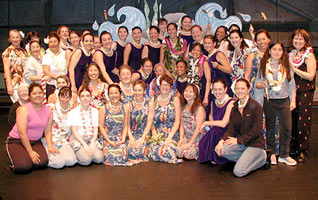Hula On! Productions
Hawaiian hula
 Hula On! Productions and Halau Hula Na Pua O Ka La’akea was formed in March of 1996 by its Creative Director, Kumu Hula Shawna Kealameleku’uleialoha Ngum Alapa’i.
Hula On! Productions and Halau Hula Na Pua O Ka La’akea was formed in March of 1996 by its Creative Director, Kumu Hula Shawna Kealameleku’uleialoha Ngum Alapa’i.
Hula On! believes that hula is all that is seen, heard, felt, smelled, touched and tasted. In other words, hula is life. In the days of old Hawai’i, acknowledgement of and gratitude for daily life was celebrated in the form of mele (chants), which also served as a means to recognize the great attributes and accomplishments of Ali’i (royalty). With no written language, this rich and extensive oral tradition lead to the birth of hula and it’s importance in the survival of the Hawai’ian culture.
Today more than ever, Hula On! feels the importance of this need to preserve the culture and to pass on the rich history, deep knowledge, and life awareness of the Hawai’ian of yesterday, to the community of today. In order to accomplish this mission, Hula On! Productions and Halau Hula Na Pua O Ka La’akea organize and present various community events in the Marin area on an annual basis. The events exhibit hula in all its many forms, and allows the audience/community to actively engage fully in the cultural experience.
In 2012, Hula On! received a grant from ACTA’s Living Cultures Grants Program to support a three-day kahiko, or ancient, hula intensive workshop taught by master culture bearer Kumu Hula Pohai Souza from Honolulu, Hawai’i. She will teach choreography and the history and translations of chants. At the conclusion of the workshop, there will be at least 35 students that will become keepers of these precious historical dances.
In 2008, Hula On! received a grant from ACTA’s Living Cultures Grants Program to support thirteen Halau Hula Na Pua O Ka La’akea students in completing their ‘uniki studies, or traditional training. In the ancient Hawaiian tradition, ‘uniki studies passed on the most ancient and scared meles, ‘olis (chants), and kahiko (dance) rituals, as well as the history/philosophy behind each discipline. Students will ‘uniki (graduate) as a ‘olapa (dancer) and then as ho’op’a (memorizer/chanter/drummer).
